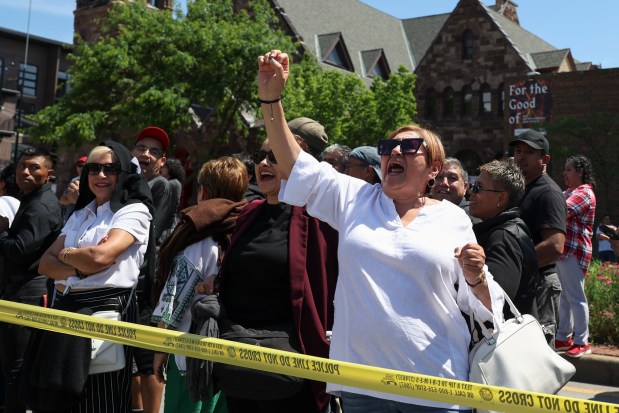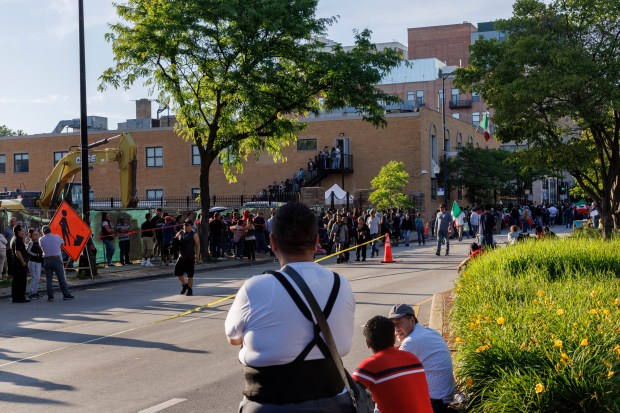At a gathering in Chicago’s Little Village neighborhood Sunday night, Mexican nationals celebrated the then-projected winner, Claudia Sheinbaum, as the country’s first woman president. Some had waited over 10 hours in line outside the Mexican Consulate in Chicago to cast a vote from abroad in person for the first time, but they were excited to be a part of history.
Most said they never doubted that Sheinbaum, a protege of current President Andres Manuel López Obrador and his leftist Morena party, would win the election. Some of them campaigned for her in Chicago, hosting rallies, marches and other events over the past few months.
For some Mexican nationals in Chicago, the historic landslide win means another six years of “a government that puts its poor and working-class first,” said Elvira Arellano, one of the leaders of the Morena movement in Chicago. About 200 people danced and toasted along with Arellano Sunday night at Mi Tierra, 2528 S. Kedzie Ave., adorned with the party’s burgundy colors and the Mexican flag.
The overwhelming support for Sheinbaum was evident among the thousands of Mexican nationals, who began arriving at the polls before 5 a.m. Sunday. By noon, thousands of people took over South Ashland Avenue, forcing police to close off streets and set up barricades to control the crowd.
More than 184,372 Mexican nationals voted from abroad, more than double the 2018 presidential election. Thousands across the world were left out in the 23 consular offices that held in-person voting for the first time.
Mexican nationals voiced their disconnect, criticizing the lack of coordination by the National Electoral Institute. Only 1,389 Mexican nationals in Chicago were able to cast a vote in person Sunday, according to the INE. More than 1,317 registered to vote and there were 1,500 open electronic ballots available.
Hundreds could not cast a vote even after waiting in line for more than 12 hours because they couldn’t reach the polling booth before its 7 p.m. closing time.
Nonetheless, they cheered the crowd and encouraged them to vote for Sheinbaum.
“Morena, Morena,” some chanted after voting.
In all, 10,560 Mexicans in the Chicago area registered to vote in person, online and through the mail, making Chicago the city with the second-highest number of Mexican nationals registered to vote in the United States, according to Eduardo Puga of the National Electoral Institute.
While many were excited to pick the first woman president of the country, many more were eager to vote to ensure that the Morena, led by populist leader López Obrador, colloquially known as AMLO, stays in power.
Over the last six years, López Obrador has been praised by some for defeating the established parties that had ruled Mexico in 2018, pushing to end corruption and strengthening the social welfare system for the poor and working-class citizens.
Sheinbaum has promised to continue current policies of expanding social programs for the low-income and working class.
That’s something that speaks loudly to Mexican immigrants in Chicago, said Lilia Fernandez a professor at the University of Illinois at Chicago who specializes in the history of Latinos in the mid-to-late 20th century United States.
Most Mexican nationals living in Chicago come from small rural towns, pushed out for economic reasons or violence, she said. Most remain part of the working class and deeply care for those still in Mexico or hope to return someday. So the support for the party despite the criticism it has received, does not surprise her.
“For those working-class immigrants in Chicago seeing Morena and AMLO investing in the people’s economy and strengthening the social safety net is very encouraging,” Fernandez said. “The landslide win shows that Morena has found more support than its critics are giving it credit for.”
Though he remains popular, López Obrador has shown himself to be intolerant of criticism and oversight. His critics say his moves to attack the judiciary, slash funding to Mexico’s electoral agency and expand the military’s responsibilities in civilian life have eroded Mexican democracy. The opposition has responded with large protests.
López Obrador is considered Sheinbaum’s mentor, and her election cements his legacy and shows that his Morena party can survive. The new president, Fernandez said, faces a number of challenges, including cartel violence, a water shortage and the ongoing impact of global warming and climate change.

Edith Cortez waited in line for nearly 10 hours to cast a vote for Sheinbaum even though she had not been to Mexico for 34 years. Despite the frustration, she said she was committed to being a part of history to elect the first woman president.
Cortez of Guerrero, Mexico said that she voted for Sheinbaum because the lives of her family in Mexico have changed for the better over the last six years under AMLO. She also hopes to return to live there one day.
“But there is still a lot of work to be done,” Cortez said. Some of her family members have been victims of cartel violence and she is confident that Sheinbaum will address that though Lopez Obrador has been criticized for failing to address violence in the country. “Some may not agree that AMLO has done a good job, but I disagree, he has done much more than the former president in six years, Sheinbaum can continue with those changes.”
Other Mexicans in Chicago said some of the most important issues for them include social benefits for senior citizens and low-income families, safety, the economy and U.S-Mexico relationships.
Arellano, an immigrant activist, in the country without legal permission, known for seeking sanctuary and taking refuge at a church in 2006, said that she campaigned for Sheinbaum hopeful that her administration prioritized the relationship between the U.S. and Mexico to address a way to create immigration reform for the millions of Mexicans living in the country illegally.
For Juana Dominguez, 77, of Michoacan, Mexico, a new Morena era means more advancement and recognition of those in need.
“She’s beautiful and wise in so many ways,” said Domingez about Sheinbaum. “They (Morena) have helped us older people a lot.”
“Por lo menos nos dan para la tortilla, ”said Daniel Peña Salgado, 76, of Morelos, Mexico. “At least they give us some money to buy tortillas,”

Peña Salgado pointed out that he and his family are carpenters, agricultural workers and artists who have worked their whole lives.
Though he couldn’t vote after waiting in line for more than eight hours, he was confident that Sheinbaum would win.
While some criticize the social welfare programs that include giving an allowance to adults 65 and older, arguing it is a socialist practice, Mayra Lopez-Zuniga, a political strategist based in Chicago, said that it is a way of recognizing a population that had been systematically kept in poverty and ignored by former ruling parties.
“The fact that people are willing to go out and vote, wait in line for hours, shows that they (Morena) are speaking to the people and people are responding,” Lopez-Zuniga said.



